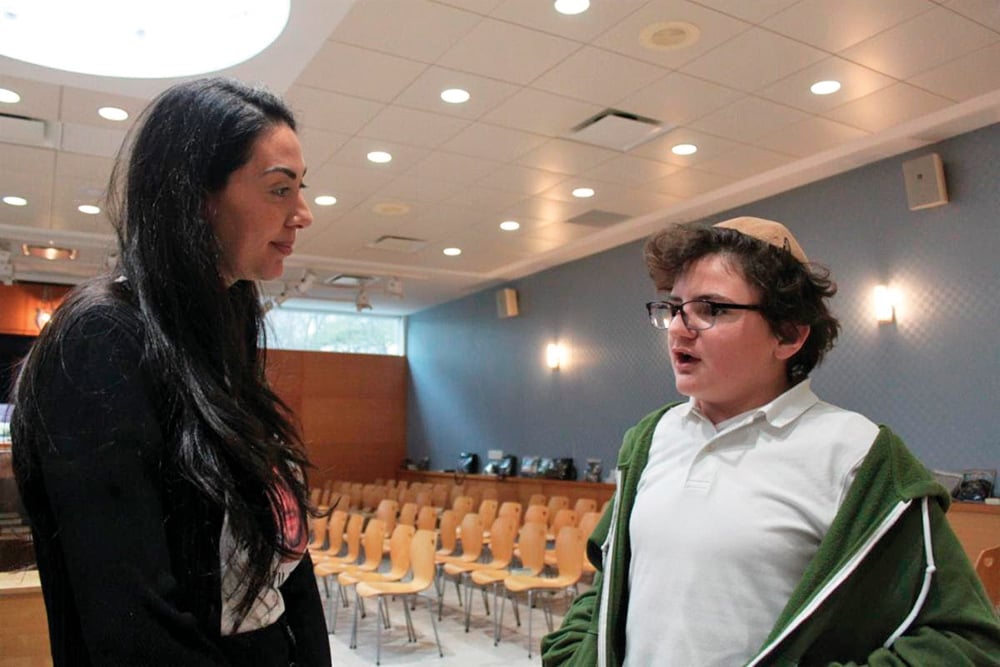Shlomo Markowitz was no delicate “snowflake.” He didn’t get insulted easily, and he definitely didn’t mind when people made insensitive jokes. Shlomo was tough, and he never let sensitive “wimps” tell him how to speak. In fact, Shlomo wasn’t just a non-wimp, he was a hero! When teachers asked students not to bring up certain topics that upset people or caused arguments, Shlomo would fight back. “Freedom of speech! First Amendment!” But was Shlomo rewarded for his heroism? Nope. Instead, Shlomo got to practice his freedom of speech in the principal’s office.
At lunch one afternoon, Shlomo and his “bros” (that’s what he called his friend) were talking about movies. “Dude,” said Shlomo, “my favorite has to be ‘Deadly War Kings.’ The explosions are so sick and the guns are so cool.” (Plot twist: Shlomo never saw the movie; his parents didn’t think it was appropriate for a 12-year-old. But how would his “bros” know the difference?).
Shlomo’s friend Judah then chimed in. “My parents made me take my little brother to see ‘Teeny Tiny Puppy Poodles’ on Sunday. It actually wasn’t so bad.” This was too much for Shlomo to handle. “Not too bad! That’s a baby movie. I can’t believe you like a baby movie!” Everyone in the group started to laugh, except Judah, who was obviously insulted. However, the bell rang, ending lunch, and the boys started gathering up their things to get ready for sixth period.
Later that evening, Shlomo’s mother received a phone call from Judah’s mother. Judah was really insulted by Shlomo’s comment that day, and really didn’t know what to do. Shlomo was a good friend of Judah’s and Judah didn’t understand why Shlomo was so mean to him. “Shlomo, honey” said his mother at dinner, “you have got to be more careful how you talk to other people, especially Judah. You can’t call his ideas ‘dumb,’ his taste in movies ‘for babies,’ and his favorite football team ‘a bunch of losers,’ and expect him to be your friend.” Unfortunately, Shlomo didn’t understand. “But Mom! Judah’s idea to sell plastic sporks to raise money for the yearbook WAS dumb—even he admitted it. ‘Teeny Tiny Puppy Poodles’ literally IS a movie for babies, and the Jets have lost almost every game for the past 10 years. They literally ARE a bunch of losers.”
Shlomo’s father wasn’t helpful either. “C’mon dear,” he said to his wife. “It’s not Shlomo’s fault that Judah is so sensitive. They’re in middle school! Boys will be boys. Tell Judah’s mom he’s gotta toughen up.” These comments did not make Mrs. Markowitz particularly happy, but she kept her cool and turned back to her son. “Your father might think it’s OK to be an insensitive bully, but it’s not. Be better.” And with that, she stood up and walked out of the room. Shlomo and his father looked at each other, shrugged their shoulders and went back to eating.
That evening, Shlomo and his father went to daven Maariv, but arrived a few minutes early. They grabbed siddurim, walked into the main shul and went to their regular seats. As they sat down, a group of men was engaged in what sounded like a Torah discussion. Shlomo’s father leaned forward to listen in. “… didn’t care about upsetting them. He wasn’t very sensitive to their soft spots.” Shlomo’s dad smiled and decided to join in. “Exactly! Too many people care about upsetting others, but we can’t care so much!”
One of the men turned to face Shlomo’s father. “Actually, we were just saying how the opposite lesson can be learned from Yosef and his brothers—the importance of being more sensitive towards others.” Once again, Shlomo’s father was not convinced. “That’s ridiculous. The Torah doesn’t say anything like that. Who would come up with such a silly idea?” Well, that comment got everyone quiet. Mr. Markowitz started to smile proudly, but he then noticed the uncomfortable looks on the mens’ faces. Suddenly, a familiar voice began to speak. “Actually, it was my idea. Would you like to hear more?”
Mr. Markowitz’s face lost all color. “Rabbi Kornfeld. I’m so sorry. I didn’t mean to insult you. I just, I just, I’m just so tired of people saying how others should speak. It’s like we are so afraid of upsetting people.” Rabbi Kornfeld smiled. “And what is so bad about that?” Shlomo’s father paused to think for a moment. “Nothing, of course. Just some crazies have gone so overboard with it that I feel like it’s too risky to speak at all!” Again, Rabbi Kornfeld smiled. “Nu. Why let those people affect the way you speak? If they are just ‘crazies,’ as you say, why should you care?” Mr. Markowitz took another pause. “I guess you are right. Seems like those people have made me a bit…” Rabbi Kornfeld winked. “Sensitive?” Josef’s father smiled sheepishly. “I guess so.”
In this week’s parsha, we read about the pain and suffering that was caused by Yosef’s brothers selling him. What is at the root of all this pain? In last week’s parsha, before Yosef even tells his brothers the first dream, the pasuk says that his brothers hated him for his dreams, in plural. Why? Well, Yosef was already his father’s favorite, and Yaakov was famous for his dream with the ladder. So by just bringing up dreams—even without describing a specific one—Yosef was implying to his brothers, “not only does Dad love me more, but my dreams matter, just like his.”
Even if this isn’t what Yosef meant, he should have known his brothers would be sensitive to any Yaakov-related comments. In turn, Yosef’s brothers, caught up in their anger, didn’t think about how selling Yosef would destroy Yaakov. Let us learn from the decisions made by Yosef and his brothers, and try our best to be a little more careful not to hurt the feelings of those around us (even if people are being a little “sensitive”).
Yair Daar is the middle school dean of students at Yeshivat He’Atid. He can be reached at [email protected].
By Yair Daar













